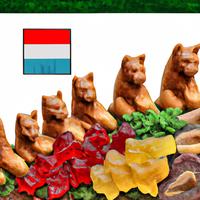
1 serving (40 grams) contains 140 calories, 2.0 grams of protein, 0.0 grams of fat, and 34.0 grams of carbohydrates.

Log this food in SnapCalorie

Nutrition Information
Calories |
560 | ||
|---|---|---|---|
% Daily Value* |
|||
| Total Fat | 0 g | 0% | |
| Saturated Fat | 0 g | 0% | |
| Polyunsaturated Fat | 0 g | ||
| Cholesterol | 0 mg | 0% | |
| Sodium | 40 mg | 1% | |
| Total Carbohydrates | 136 g | 49% | |
| Dietary Fiber | 0 g | 0% | |
| Sugars | 96 g | ||
| protein | 8 g | 16% | |
| Vitamin D | 0 mcg | 0% | |
| Calcium | 0 mg | 0% | |
| Iron | 0.8 mg | 4% | |
| Potassium | 40 mg | 0% | |
* Percent Daily Values are based on a 2,000 calorie diet. Your daily values may be higher or lower depending on your calorie needs.
Food Attributes
Source of Calories
About Haribo gummis
Haribo Gummis are colorful, chewy candies originating from Germany, known for their iconic gummy bears. Made primarily from sugar, corn syrup, gelatin, and flavorings, they come in various fruit flavors and shapes. As a product rooted in German confectionery traditions, Haribo Gummis have gained global popularity for their fun and vibrant appeal. While they are fat-free, their high sugar content makes them a treat best enjoyed in moderation. Gelatin provides a source of protein, though the amount is minimal in the context of overall nutrition. Haribo Gummis lack essential vitamins and minerals, making them a less nutrient-dense option. They are often favored as an occasional snack or dessert but are not recommended as part of a balanced diet. For those with dietary restrictions, Haribo offers some variations, though gelatin-based products are unsuitable for vegan or vegetarian consumption.



